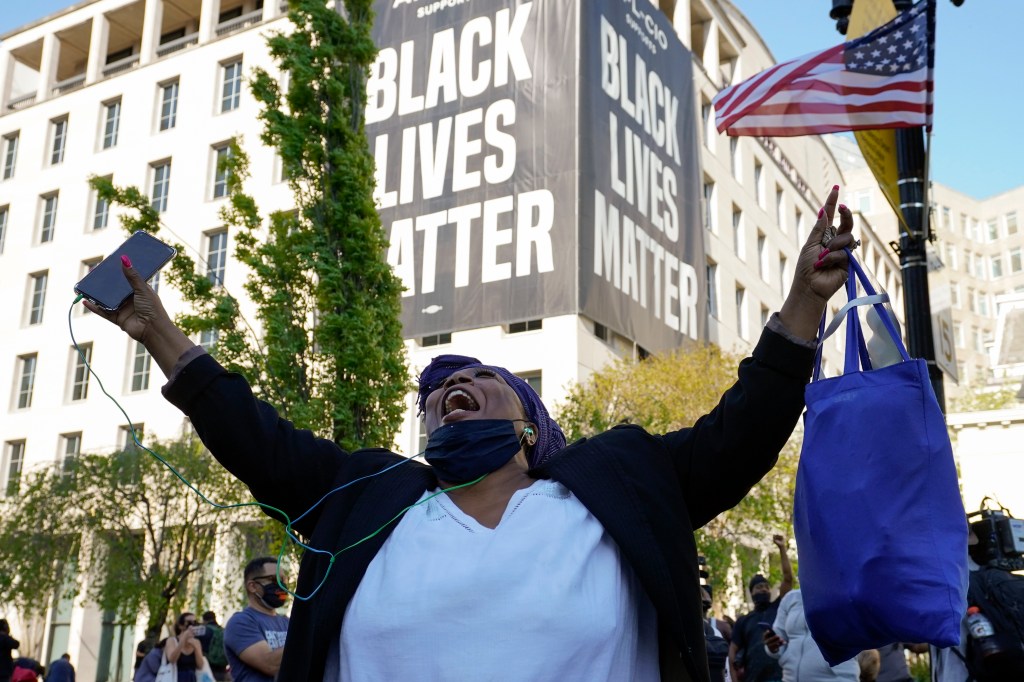VERDICT GIVES HOPE: Chauvin found guilty in Floyd’s death
Published 7:22 pm Tuesday, April 20, 2021

- Lisa Robinson of Washington, reacts on Tuesday, April 20, 2021, in Washington, as the guilty verdict in Minneapolis, in the murder trial against former Minneapolis police officer Derek Chauvin was announced.
Former Minneapolis police officer Derek Chauvin has been convicted of murder and manslaughter in the death of George Floyd, a death that sparked protests across the nation and around the world.
The verdict set off jubilation around Minneapolis. People flooded downtown streets, running through traffic with banners, and cars blared their horns. Members of Floyd’s family gathered at a Minneapolis conference room, where they could be heard cheering and even laughing.
Trending
In Limestone County, Diana Isom said she cried as the verdict was read Tuesday. Isom is an organizer with Black Lives Matter Athens and has attended and worked to set up multiple protests in the area over the last year.
“I’m so happy,” she said. “I was very, very nervous, because a lot of times justice is never served for Black people, so finally seeing a guilty verdict gives me hope in this world that I didn’t have for a long time.”
Chauvin held his knee into Floyd’s back for more than nine minutes as bystanders recorded the incident on their phones and called for Chauvin to stop or for the other officers nearby to intervene. The centerpiece of the case against Chauvin was a video in which Floyd can be heard gasping repeatedly, “I can’t breathe,” before going silent and limp.
Three fired Minneapolis police officers face trial in August on charges of aiding and abetting murder in Floyd’s death. Numerous law enforcement veterans and police-procedure experts testified in Chauvin’s trial that Chauvin used excessive force and went against his training.
Athens Police Chief Floyd Johnson said he had never seen an officer use such a tactic before to subdue a suspect, and he still doesn’t exactly understand how the murder was allowed to happen as it did.
“That’s why we train constantly,” he said. “(Policies and training) are there for a reason, to keep things like this from happening here.”
Trending
Johnson said he was “absolutely appalled by the video,” and that he hopes those in the profession learn from it.
“This has affected our country and will from now on, I’m sure,” he said.
In the months that followed Floyd’s death, numerous states and cities have restricted the use of force by police, revamped disciplinary systems or subjected police departments to closer oversight. Wilbert Woodruff, president of the Limestone County NAACP, called for legislators at the local, state and federal levels to continue using this moment to enact change. He said the NAACP has long advocated for police and criminal justice reform, and while Chauvin’s verdict gives him hope, too, it doesn’t mean the fight is over.
“We’ve got to change some things so our future gets better for our children, for the next generation,” he said. “We can’t survive like this, killing our own.”
Less than a week before the verdict was announced, Daunte Wright, a 20-year-old Black man, was shot and killed by Kim Potter, a white police officer in Brooklyn Center, Minnesota, who has since resigned. The Brooklyn Center police chief at the time, Tim Gannon, told news outlets that Potter had mistakenly used her handgun instead of her Taser. He later resigned as well.
Potter has been charged with second-degree manslaughter for her role in Wright’s death. Isom joined others, including members of Wright’s family and Brooklyn Center community leaders, in saying the charge isn’t harsh enough.
Isom said after Wright’s murder, she decided to make the trip from Athens to Minnesota to join protestors there. She stayed from Wednesday until Friday of last week, and she said it was a completely different experience from the protests she’s joined in Alabama.
“Watching the National Guard in front of you, having their guns right there, it’s so different,” she said.
More than 3,000 National Guard soldiers, along with police officers, state police, sheriff’s deputies and other law enforcement personnel were in Minneapolis during the trial, leading some to describe the city as feeling “like it’s occupied by the military.”
Isom said now that the verdict has been read, she hopes they — and any other law enforcement officer — realize the time is over to be protecting one another and it is time instead to step in and hold those who step out of line accountable for their actions.
“I’m not going to say, ‘This is it, this is going to be the stepping stone,’ but I will say this is hope for me,” she said.
Chauvin, 45, was found guilty of second-degree unintentional murder, third-degree murder and second-degree manslaughter by a jury of six white and six Black or multiracial people. His bail was immediately revoked, and sentencing will be in two months. He faces up to 40 years in prison.
—The Associated Press and J.R. Tidwell contributed to this article.





